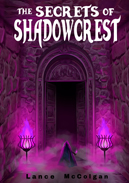
 |
With the holidays approaching, quality family time for Lord William Steele gets interrupted by an urgent request from Henry II, king-in-waiting and the rightful claimant to the throne. The fear that King Stephen has something nefarious planned to wipe Henry out has Henry himself making his own moves. What ensues is a whirlwind adventure that transports William to ancient lands while testing his integrity and loyalty to Henry, often at the risk of his own existence. Fusing genres to traverse into the historical fantasy space, McColgan sets the stake high (the throne of England itself), prompting William to journey through a life-threatening mist to a long-forgotten land, the Cabalian Islands, and negotiate a deal that would ensure Henry’s security, and in all likelihood, the throne.
From the get-go, McColgan’s command of storytelling is on full display, chiefly through his ability to balance dialogue and exposition, creating a seamless flow that is a catalyst for audience engagement. The blue allure of the Danuri stone, for instance, sets the tone for the fantasy world of Cabalia. With the stone, an individual can manipulate many elements of reality, such as procuring fire or morphing their spoken tongue into the language of the person with whom they are communicating. Nevertheless, it isn’t until William accidentally encounters the daunting Brinwin and his sister Zala that the narrative assumes a frenetic pace.
A seemingly simple mission to rendezvous with Henry’s connection on Cabalia and acquire shadesteel breaks down into mass chaos: a man spontaneously combusts in broad daylight, and William is the prime suspect. On the one hand, he is hunted by the inquisitors, while on the other, the clock is ticking for him to get the shadesteel, get back to his ship, and return to London. The sense of urgency and tension that McColgan imbues within his storyline adeptly allows him to slightly lull the audience with the history of the Essari people and their knack for inventions. Amidst the tension, the author weaves a backstory of redemption for both Brinwin and Zala that instantly renders them endearing and leaves audiences rooting for the brewing chemistry between the mischievous yet skilled alchemist Zala and the equally skilled and witty William. The humanness of all three characters transcends surface-level relationships, instead depicting a level of resilience that is entirely necessary considering the challenges they face.
In particular, the author does an impeccable job of shifting gears from a story centered around William and Zala to a concurrent and just as compelling storyline: the continuing duel and cat-and-mouse chase between Brinwin and Raiko. Elements of David and Goliath permeate the tenacious battle between the two, with Brinwin almost relishing the idea of being captured by the relentless Raiko. In fact, as the novel progresses, Brinwin shows an unquestionable admiration for his archrival’s devotion to the law and ethics of the land when all others have lost their moral compass.
Above all else, the “why” factor for each of the main characters is profound, whether that is being banished, leaving by choice from an exclusive society, or mourning the loss of a loved one. Additionally, the manner in which McColgan brings each of the characters’ backstories, trials, and tribulations to the surface is integrated to perfection with the unraveling storyline of the present moment and the quest for William to fulfill his duty. Though the tone is set for a very Campbellian Hero’s Journey arc, the author deftly uses the same world he has built to mix in a dash of realism to his storyline. The end product is a scintillating fusion of Sanderson-esque worldbuilding and storytelling, resulting in a must-read page-turner that will leave audiences anxiously awaiting their next journey into Cabalia.
RECOMMENDED by the US Review